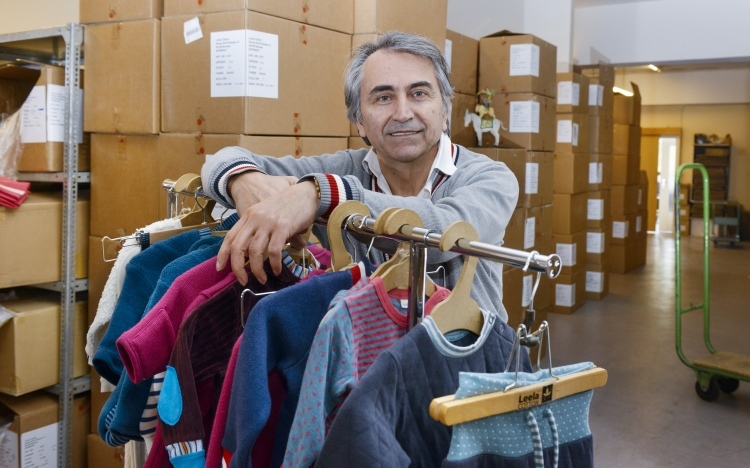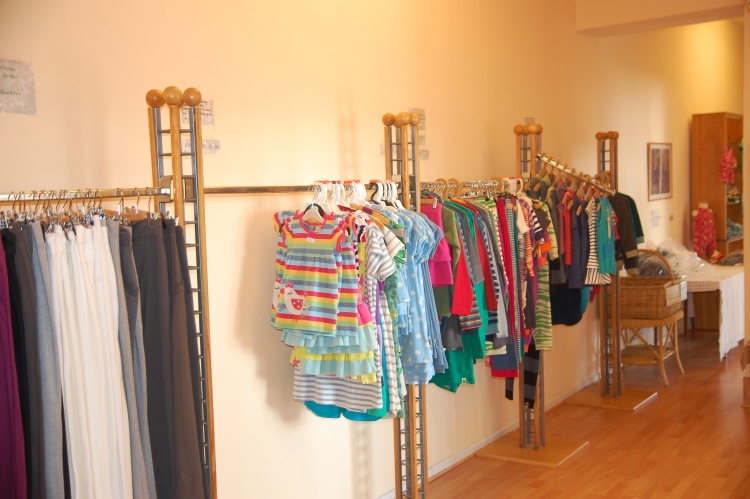Leela Cotton – sustained success through sustainability
Investing in BremenThe German-Turkish company that manufactures certified fair trade clothing

Environmentally friendly manufacturing and ethical standards are the principles on which the fair trade clothing sector is based. The idea that saving the planet has to mean looking as though you are dressed in old potato sacks, however, couldn’t be further from the truth. Leela Cotton, a successful German-Turkish textile company, produces clothes for children and adults that are not only stylish, but also make a positive contribution to the environment in the way they are manufactured.
As you step inside Leela Cotton, you are greeted by the radiant glow of warm colours and a cosy, cordial atmosphere. There are plenty of things that catch your eye: wooden racks filled with stripy, colourful children’s clothes, pictures lining the walls, an assortment of instruments that includes two pianos and a saxophone. It’s a workplace that looks more like the inside of someone’s home – a place where you can feel at ease. And the laid-back owner Kemal Bektas certainly appears comfortable as he begins to recount the story of his success.
Ecological fashion that’s environmentally friendly
The Bremen-based textile company Leela Cotton has produced items of clothing made from organic cotton since 1993, selling a range of products that includes children’s clothes, yoga wear, nightwear and towels. The people behind Leela Cotton are Kemal Bektas and his wife Susanne – but what’s behind the name itself? “In Sanskrit, Leela means ‘divine play’. My grandma was called Leyla, and so is my eldest daughter,” explains the business owner.
Bektas has lived in Germany since 1976. He was initially based in Cologne, completing his studies in architecture there in 1984. A job offer then led him to Bremen, where he not only met his wife, but also fell in love with the city at first sight.
I used to walk through the streets in the twilight, fascinated by Bremen’s houses.
Kemal Bektas, Managing Director of Leela Cotton
The couple discovered their interest in the textile industry while they were producing T-shirts for Greenpeace. Hoping to create something sustainable themselves, Susanne and Kemal Bektas founded their own small production company in 1993. Bektas sees a link to his architectural studies in his work, focusing on artistic elements and the way that shapes and colours interact with each other. He produces the majority of his designs in Turkey, where Leela Cotton’s production site is located, and examines new materials at the site himself. Years of experience have given him an idea of which designs and materials go down particularly well with customers.
Local operations, global standards
All of Leela Cotton’s manufacturing operations take place in Izmir, Turkey. The finished shirts, pullovers and duvet covers are then transported to Bremen by lorry. The cultivation and processing of the cotton and the production of the clothing all takes place within an area of 100 square kilometres. This facilitates a sustainable manufacturing process that would not have been feasible otherwise. “Nowadays, there are many suppliers selling products made from organic cotton at extremely low prices. This is only possible if you save on manufacturing costs,” Bektas points out. He explains that the cotton is often flown over to another country, where workers are poorly paid. “Transporting goods by air as part of the production chain goes against a sustainable approach, and therefore everything we do takes place close together,” he says, explaining the compact nature of his business.
We don’t just want to live well off the business – it’s important that we can stand behind it and feel good about what we’re doing.
Leela Cotton is certified by the Global Organic Textile Standard (GOTS). This means that its manufacturing procedures are subject to strict guidelines that are re-assessed every year – guidelines that cover every stage of the process, from the farming of the cotton to the finished article of clothing. In order to receive a GOTS certificate, a business has to meet certain social and ecological standards, such as paying its workers a living wage and forgoing the use of pesticides. “I believe that what I’m doing makes sense. Not just for the whole environment, but for my own little ecosystem, as well,” Bektas says with pride.

Maintaining the work-life balance in the face of increasing demand
Since the 1980s, the demand for eco-friendly fashion has risen considerably. Having chosen to base himself in Bremen, Bektas took advantage of the boom to expand his business, and he now manages around 1,000 square meters of warehouse and office space. He is assisted by ten employees, who help him to dispatch products that are sold all over the world. About 60 per cent of Leela Cotton’s goods are delivered to locations in Germany, though the company also has customers in Sweden, France and Switzerland. Even as far away as Japan and Australia, people are buying sustainable clothing made by this Bremen-based company.
Bektas admits that Leela Cotton could have ridden the wave of demand for organic and fair trade products to grow even bigger as a company, if they’d wanted to. However, he ultimately decided against further expansion. “Otherwise, I wouldn’t be able to play my saxophone anymore,” he explains, proudly pointing out a poster on the wall that shows him with his saxophone group, the ‘Bremer Saxen’.
The joy of interacting with customers
What Kemal Bektas enjoys most about his work is the contact he has with his customers. “We have a very friendly relationship with them. You can always get feedback through your customers’ reactions, and that’s very nice.”
There’s no online shop as of yet. “That’s a project for the next generation,” he chuckles. Nevertheless, it’s still possible to purchase items at the site itself – Leela Cotton opens its doors at Georg-Wulff-Strasse 15 every Thursday between 9am and 3pm for its warehouse sale. The products on offer here include discontinued lines and items with minor stitching defects, which are available at reduced prices. The best way to get your hands on Leela Cotton’s latest collections is to hit the shops in Bremen, with Fairtragen, Naturzwerg and Prinzlinie all stocking the company’s products.
Bremeninvest has established field offices in its key countries of China, Turkey and the USA. Our colleagues at these offices will be happy to advise you on all matters relating to investment in and/or setting up a business in Bremen, as well as facilitating cooperation with Bremen-based companies.
If you are interested in investing from Turkey, please contact Kolja Umland, kolja.umland@wfb-bremen.de, Tel.: +49 (0)421 9600 339.
Click here for further information on relocating to Bremen and setting up a business in the city.
Success Stories
Bremen’s Economy in Figures: Statistics 2025
The State of Bremen is a strong economic hub. A look at the latest statistics highlights its economic strength — summarising key data such as cargo volumes, export performance, industry turnover, and more.
Learn moreMedium-Sized Companies in Bremen Showcasing the Full Range of the Local Economy
Medium-sized companies form the backbone of Bremen’s economy. They create jobs and produce goods that are in demand worldwide. Here is a selection of ten businesses that illustrate the diversity of Bremen’s economic landscape.
Learn moreMeasure, Test, Inspect – 11 Examples of Precision Engineering from Bremen
Not many people could name a manufacturer of metrology and testing equipment, but without their products we would not have space probes, aircraft or medical equipment. And Bremen is home to a whole host of these specialist companies.
Learn more
